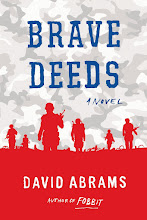My First Time is a regular feature in which writers talk about virgin experiences in their writing and publishing careers, ranging from their first rejection to the moment of holding their first published book in their hands. Today’s guest is Eric Rickstad, the New York Times, USA Today, and international bestselling author of The Canaan Crime Series: Lie in Wait, The Silent Girls, and, his newest novel, The Names of Dead Girls. Dark, disturbing and compulsively readable psychological thrillers set in northern Vermont, the series is heralded as intelligent, profound, heartbreaking and mind shattering. His first novel Reap was a New York Times noteworthy novel. His fifth novel, What Remains of Her, is poised to be the most addictive and creepy read of the summer of 2018. Rickstad lives in his home state of Vermont.
The First Time I Knew I Had to Write
I can’t remember a time I did not read. Long before it was ever expected that kids “graduate” from kindergarten with the ability to read, I was reading at the age of four. In the fifth grade, I attended “literary luncheon” with the school librarian. Twice a week, instead of having lunch in the cafeteria, ten 5th graders met with the librarian in the principle’s conference room to discuss the merits of Encyclopedia Brown, The Secret Garden, Charlotte’s Web, Danny Champion of the World, and Freckle Juice.
I always wrote, too. When I read, I wanted to know how the writer did that, how she used words to manipulate my emotions so I felt sad or happy or scared, or conjured images as real as any object in the physical world. So, I wrote. Yet even with the influence of all the wonderful authors, my “writing” was not with purpose or intent or passion. I was in grade school after all, so my writing did not come from inside me. I mimicked the writing of authors I liked, and was typical gruesome kid stories, rip offs of stories such as Roald Dahl’s “Pig.” My version of “Pig” was missing the social satire —way over my head at the time—and concentrated on the gore and horror, putting a man through a bubble gum maker instead of an abattoir, stretching and torturing him until he came out the other side as a wad of bubble gum, got chewed by a cat, spat out on a sidewalk, stuck to a shoe, and so on.
Then, one summer day when I was still in junior high, my older sister’s boyfriend popped a cassette tape in the player as he drove his rusted, primer gray convertible VW Bug down the highway, and said: “Listen to this.”
The opening piano notes of a song played, and a voice sang, the words combining to create a story, a magic, of the likes I’d never heard.
The screen door slams/ Mary’s dress waves / Like a vision she dances across the porch as the radio plays.
I saw Mary in her dress. I saw her standing on the porch. By the song’s finale, I saw her graduation gown lying in rags at their feet. I felt the lonely cool before dawn and heard their engines rolling on. I felt her aloneness, and the narrator’s aloneness and desperation and sincerity for something different, something more.
As the album continued, I felt the earnestness and fleetingness of youth and love, and their often broken promises. I felt the pain in the words. The lust and sadness. The struggle. The triumph. The loss. I felt the shots echo down them hallways in the night. I felt the hot sun and the mysterious nights and the complete freedom yet imprisonment of driving with no place to go. I had not yet lived any of these things, and I say I felt them because I did not really understand them. Yet, my gut and my heart felt it all, were awakened by the lyrics in a way no novel or short story had awakened them. That album reached me because of a deep loss in my life. My father had left my mom and three sisters and me a few years earlier, and that void, the pain and loneliness of it, was understood and respected in the words I heard blasting out the car speakers.
I saved up and bought the album and I played it over and over and over again trying to decipher its mysteries. I fell asleep listening to it, and awoke to the stylus of my cheap record player scratching in its endless final groove, cssuuusssh cssusssh csusssh, and before I rose from bed, I’d pick up the needle’s arm and set the needle back at the beginning to start my day.
Lyrics such as Barefoot girl sitting on the hood of a Dodge / Drinking warm beer in the soft summer rain and The poets down here don’t write nothin’ at all / They just stand back and let it all be cut to the quick. I knew nothing of this guy Springsteen. But I knew he meant it. He got it. He understood; and as I began to read about him, I saw comparisons in our lives of growing up working class poor, and our estrangement from our father’s, our loneliness and sense of being observers, outsiders, and a shared urgency to put all of it down on paper, into stories that tried to make sense of it and of our place in the world. He took the common and spun myths out of it. His lyrics made me want to write. For the first time. Really write. Even though I was incapable of doing it justice at that age, I knew I had to write what was within me. Let it explode on the page, however awful the adolescent writing was, however convoluted or self-pitying, or navel gazing, or juvenile. I had to write, because those lyrics also made me feel I had something to say, that we all do.
So, I wrote. And I’ve never stopped. I wrote, and learned how to “show” and not “tell” by listening to Born to Run, Darkness on the Edge of Town and Nebraska thousands of times. I wrote, influenced by lyrics that possessed a singular voice, deep internalized emotion, a keen sense of place and story, and a lingering sense of mystery as to how the precise combination of words can resonate so powerfully. There is a magic to it.
I’ve tried to bring those essential elements to everything I’ve ever written, and it’s that combination I seek and admire most in novels and short stories I read, no matter how dissimilar they may be in many other ways. To give readers a sense that they’re reading a story or novel no one else could have written but me, a novel or story that impacts them, makes them think or feel, is a joy. If any of my stories or novels holds up to retain a sense of mystery, I’ve done my job well. After so many years of listening to Born to Run, even though each lyric and note was memorized long ago, their mystery remains. The magic remains.
















No comments:
Post a Comment